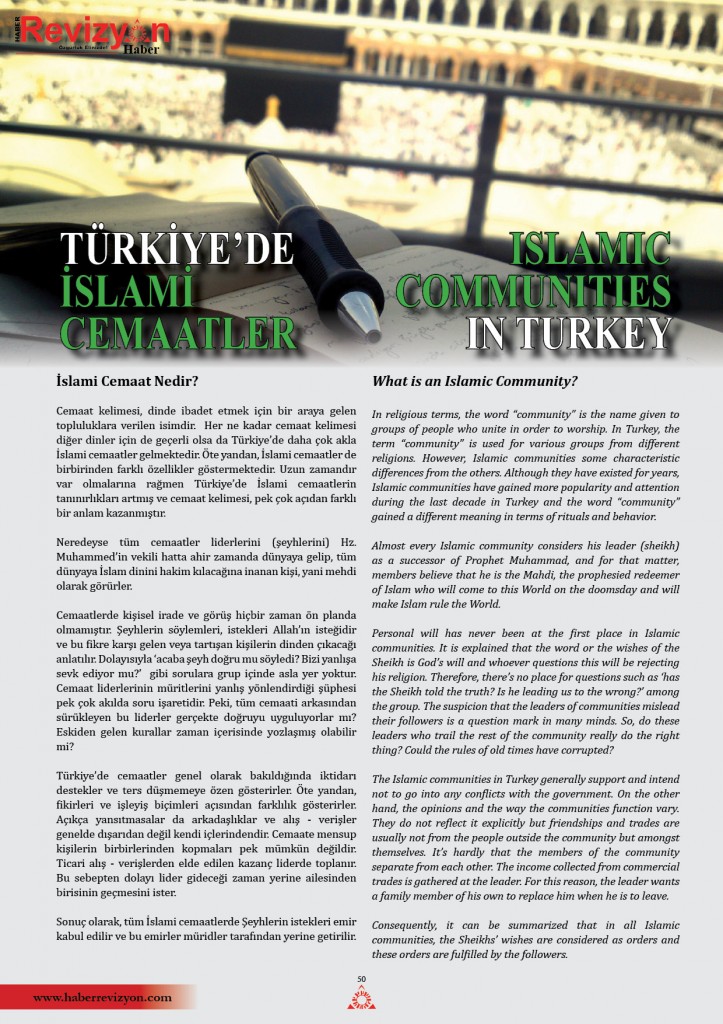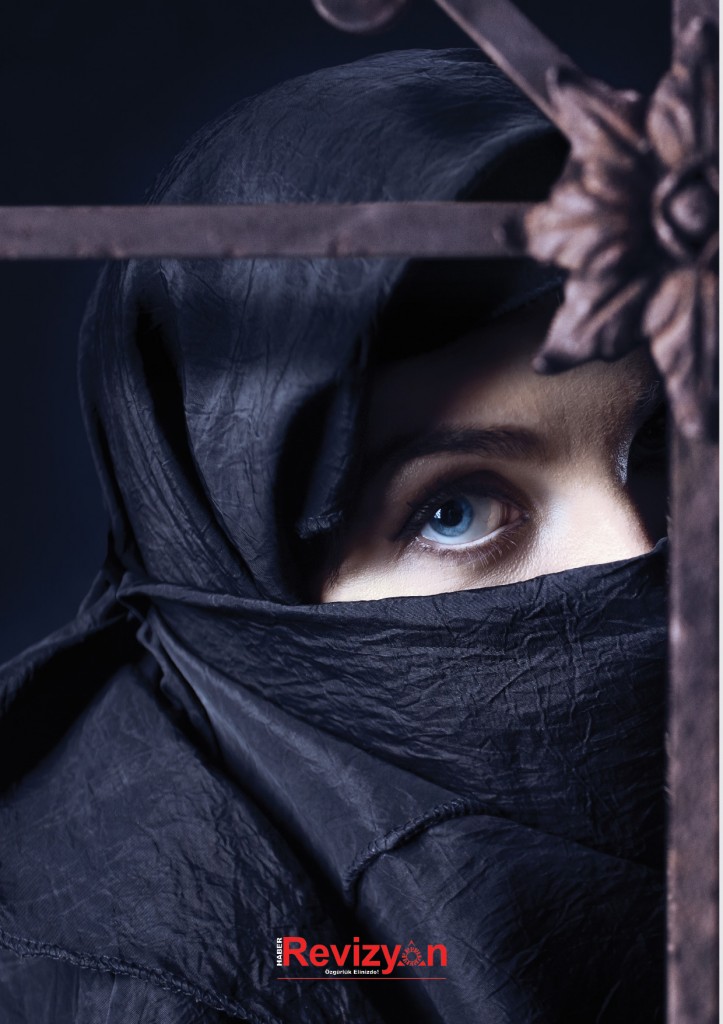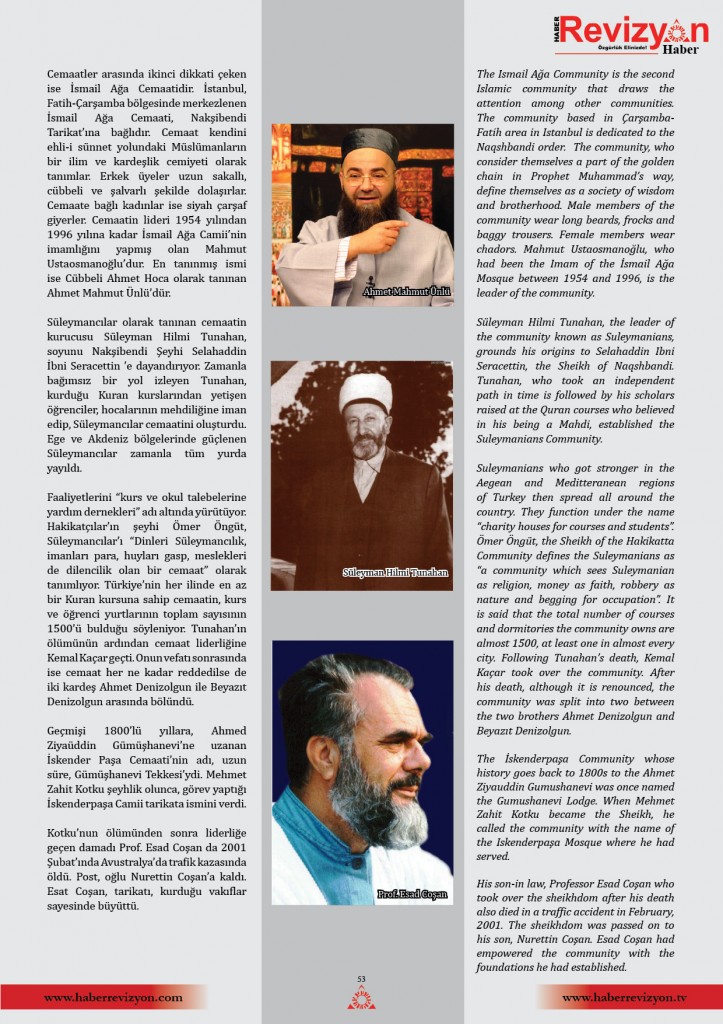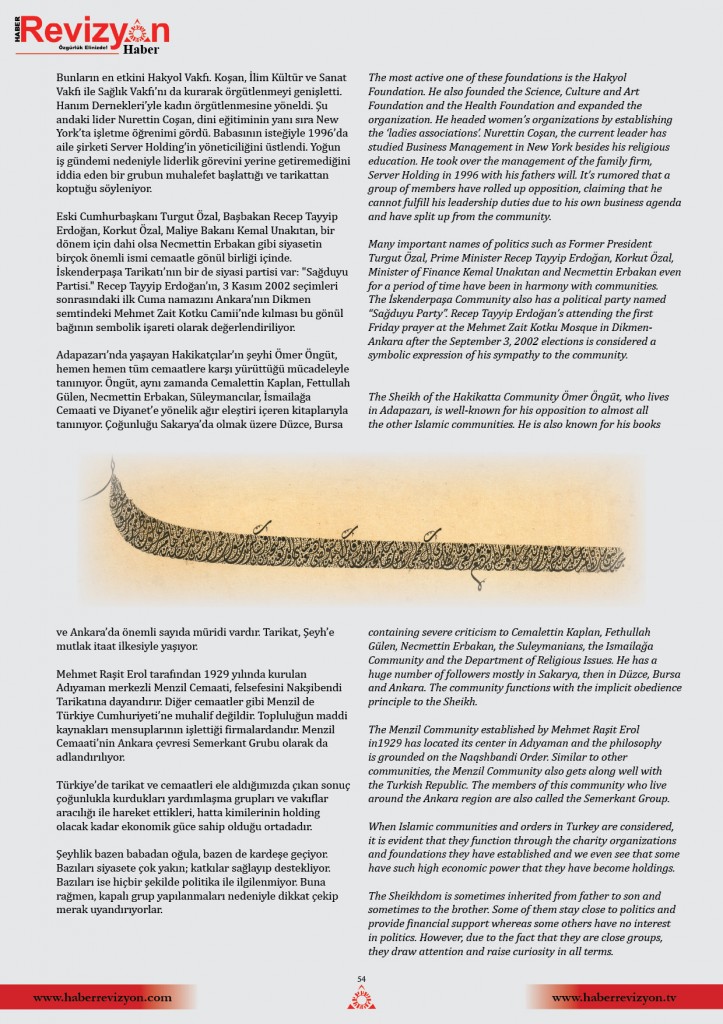Cemaat kelimesi, dinde ibadet etmek için bir araya gelen topluluklara verilen isimdir. Her ne kadar cemaat kelimesi diğer dinler için de geçerli olsa da Türkiye’de daha çok akla İslami cemaatler gelmektedir. Öte yandan, İslami cemaatler de birbirinden farklı özellikler göstermektedir. Uzun zamandır var olmalarına rağmen Türkiye’de İslami cemaatlerin tanınırlıkları artmış ve cemaat kelimesi, pek çok açıdan farklı bir anlam kazanmıştır.
Neredeyse tüm cemaatler liderlerini (şeyhlerini) Hz. Muhammed’in vekili hatta ahir zamanda dünyaya gelip, tüm dünyaya İslam dinini hakim kılacağına inanan kişi, yani mehdi olarak görürler.
Cemaatlerde kişisel irade ve görüş hiçbir zaman ön planda olmamıştır. Şeyhlerin söylemleri, istekleri Allah’ın isteğidir ve bu fikre karşı gelen veya tartışan kişilerin dinden çıkacağı anlatılır. Dolayısıyla ‘acaba şeyh doğru mu söyledi? Bizi yanlışa sevk ediyor mu?’ gibi sorulara grup içinde asla yer yoktur. Cemaat liderlerinin müritlerini yanlış yönlendirdiği şüphesi pek çok akılda soru işaretidir. Peki, tüm cemaati arkasından sürükleyen bu liderler gerçekte doğruyu uyguluyorlar mı? Eskiden gelen kurallar zaman içerisinde yozlaşmış olabilir mi?
Türkiye’de cemaatler genel olarak bakıldığında iktidarı destekler ve ters düşmemeye özen gösterirler. Öte yandan, fikirleri ve işleyiş biçimleri açısından farklılık gösterirler. Açıkça yansıtmasalar da arkadaşlıklar ve alış – verişler genelde dışarıdan değil kendi içlerindendir. Cemaate mensup kişilerin birbirlerinden kopmaları pek mümkün değildir. Ticari alış – verişlerden elde edilen kazanç liderde toplanır. Bu sebepten dolayı lider gideceği zaman yerine ailesinden birisinin geçmesini ister.
Sonuç olarak, tüm İslami cemaatlerde Şeyhlerin istekleri emir kabul edilir ve bu emirler müridler tarafından yerine getirilir.
Türkiye’de İslami Cemaatler
Türkiye’de cemaatlere bakıldığında akla ilk olarak NUR yani herkes tarafından bilinen adıyla Fettullah Gülen cemaati gelmektedir. Mürit olarak bakıldığında Nur’cuların bir hayli kalabalık olduğu herkes tarafından bilinmektedir. Tarikatın en güçlü ismi Fettullah Gülen, aynı zamanda dünyanın pek çok farklı yerinde açmış olduğu okulları ile tanınıyor.
Yüksek gelir sağlayan medya, eğitim gibi değişik iş kollarına sahip müritleri olduğundan, cemaatin güçlü finans kaynakları olduğu ortadadır. Cemaatin lideri Gülen, Türkiye’nin içinde bulunduğu siyasi koşullar sebebiyle 1999 yılında Amerika Birleşik Devletlerine gidip, o tarihten beri Pensilvanya’da yaşamaktadır.
Cemaatler arasında ikinci dikkati çeken ise İsmail Ağa Cemaatidir. İstanbul, Fatih-Çarşamba bölgesinde merkezlenen İsmail Ağa Cemaati, Nakşibendi Tarikat’ına bağlıdır. Cemaat kendini ehli-i sünnet yolundaki Müslümanların bir ilim ve kardeşlik cemiyeti olarak tanımlar. Erkek üyeler uzun sakallı, cübbeli ve şalvarlı şekilde dolaşırlar. Cemaate bağlı kadınlar ise siyah çarşaf giyerler. Cemaatin lideri 1954 yılından 1996 yılına kadar İsmail Ağa Camii’nin imamlığını yapmış olan Mahmut Ustaosmanoğlu’dur. En tanınmış ismi ise Cübbeli Ahmet Hoca olarak tanınan Ahmet Mahmut Ünlü’dür.
Süleymancılar olarak tanınan cemaatin kurucusu Süleyman Hilmi Tunahan, soyunu Nakşibendi Şeyhi Selahaddin İbni Seracettin ’e dayandırıyor. Zamanla bağımsız bir yol izleyen Tunahan, kurduğu Kuran kurslarından yetişen öğrenciler, hocalarının mehdiliğine iman edip, Süleymancılar cemaatini oluşturdu. Ege ve Akdeniz bölgelerinde güçlenen Süleymancılar zamanla tüm yurda yayıldı.
Faaliyetlerini “kurs ve okul talebelerine yardım dernekleri” adı altında yürütüyor. Hakikatçılar’ın şeyhi Ömer Öngüt, Süleymancılar’ı “Dinleri Süleymancılık, imanları para, huyları gasp, meslekleri de dilencilik olan bir cemaat” olarak tanımlıyor. Türkiye’nin her ilinde en az bir Kuran kursuna sahip cemaatin, kurs ve öğrenci yurtlarının toplam sayısının 1500’ü bulduğu söyleniyor. Tunahan’ın ölümünün ardından cemaat liderliğine Kemal Kaçar geçti. Onun vefatı sonrasında ise cemaat her ne kadar reddedilse de iki kardeş Ahmet Denizolgun ile Beyazıt Denizolgun arasında bölündü.
Geçmişi 1800’lü yıllara, Ahmed Ziyaüddin Gümüşhanevi’ne uzanan İskender Paşa Cemaati’nin adı, uzun süre, Gümüşhanevi Tekkesi’ydi. Mehmet Zahit Kotku şeyhlik olunca, görev yaptığı İskenderpaşa Camii tarikata ismini verdi.
Kotku’nun ölümünden sonra liderliğe geçen damadı Prof. Esad Coşan da 2001 Şubat’ında Avustralya’da trafik kazasında öldü. Post, oğlu Nurettin Coşan’a kaldı. Esat Coşan, tarikatı, kurduğu vakıflar sayesinde büyüttü.
Bunların en etkini Hakyol Vakfı. Koşan, İlim Kültür ve Sanat Vakfı ile Sağlık Vakfı’nı da kurarak örgütlenmeyi genişletti. Hanım Dernekleri’yle kadın örgütlenmesine yöneldi. Şu andaki lider Nurettin Coşan, dini eğitiminin yanı sıra New York’ta işletme öğrenimi gördü. Babasının isteğiyle 1996’da aile şirketi Server Holding’in yöneticiliğini üstlendi. Yoğun iş gündemi nedeniyle liderlik görevini yerine getiremediğini iddia eden bir grubun muhalefet başlattığı ve tarikattan koptuğu söyleniyor.
Eski Cumhurbaşkanı Turgut Özal, Başbakan Recep Tayyip Erdoğan, Korkut Özal, Maliye Bakanı Kemal Unakıtan, bir dönem için dahi olsa Necmettin Erbakan gibi siyasetin birçok önemli ismi cemaatle gönül birliği içinde. İskenderpaşa Tarikatı’nın bir de siyasi partisi var: “Sağduyu Partisi.” Recep Tayyip Erdoğan’ın, 3 Kasım 2002 seçimleri sonrasındaki ilk Cuma namazını Ankara’nın Dikmen semtindeki Mehmet Zait Kotku Camii’nde kılması bu gönül bağının sembolik işareti olarak değerlendiriliyor.
Adapazarı’nda yaşayan Hakikatçılar’ın şeyhi Ömer Öngüt, hemen hemen tüm cemaatlere karşı yürüttüğü mücadeleyle tanınıyor. Öngüt, aynı zamanda Cemalettin Kaplan, Fettullah Gülen, Necmettin Erbakan, Süleymancılar, İsmailağa Cemaati ve Diyanet’e yönelik ağır eleştiri içeren kitaplarıyla tanınıyor. Çoğunluğu Sakarya’da olmak üzere Düzce, Bursa ve Ankara’da önemli sayıda müridi vardır. Tarikat, Şeyh’e mutlak itaat ilkesiyle yaşıyor.
Mehmet Raşit Erol tarafından 1929 yılında kurulan Adıyaman merkezli Menzil Cemaati, felsefesini Nakşibendi Tarikatına dayandırır. Diğer cemaatler gibi Menzil de Türkiye Cumhuriyeti’ne muhalif değildir. Topluluğun maddi kaynakları mensuplarının işlettiği firmalardandır. Menzil Cemaati’nin Ankara çevresi Semerkant Grubu olarak da adlandırılıyor.
Türkiye’de tarikat ve cemaatleri ele aldığımızda çıkan sonuç çoğunlukla kurdukları yardımlaşma grupları ve vakıflar aracılığı ile hareket ettikleri, hatta kimilerinin holding olacak kadar ekonomik güce sahip olduğu ortadadır.
Şeyhlik bazen babadan oğula, bazen de kardeşe geçiyor. Bazıları siyasete çok yakın; katkılar sağlayıp destekliyor. Bazıları ise hiçbir şekilde politika ile ilgilenmiyor. Buna rağmen, kapalı grup yapılanmaları nedeniyle dikkat çekip merak uyandırıyorlar.
———————————————————————————————————————————————-
What is an Islamic Community?
In religious terms, the word “community” is the name given to groups of people who unite in order to worship. In Turkey, the term “community” is used for various groups from different religions. However, Islamic communities some characteristic differences from the others. Although they have existed for years, Islamic communities have gained more popularity and attention during the last decade in Turkey and the word “community” gained a different meaning in terms of rituals and behavior.
Almost every Islamic community considers his leader (sheikh) as a successor of Prophet Muhammad, and for that matter, members believe that he is the Mahdi, the prophesied redeemer of Islam who will come to this World on the doomsday and will make Islam rule the World.
Personal will has never been at the first place in Islamic communities. It is explained that the word or the wishes of the Sheikh is God’s will and whoever questions this will be rejecting his religion. Therefore, there’s no place for questions such as ‘has the Sheikh told the truth? Is he leading us to the wrong?’ among the group. The suspicion that the leaders of communities mislead their followers is a question mark in many minds. So, do these leaders who trail the rest of the community really do the right thing? Could the rules of old times have corrupted?
The Islamic communities in Turkey generally support and intend not to go into any conflicts with the government. On the other hand, the opinions and the way the communities function vary. They do not reflect it explicitly but friendships and trades are usually not from the people outside the community but amongst themselves. It’s hardly that the members of the community separate from each other. The income collected from commercial trades is gathered at the leader. For this reason, the leader wants a family member of his own to replace him when he is to leave.
Consequently, it can be summarized that in all Islamic communities, the Sheikhs’ wishes are considered as orders and these orders are fulfilled by the followers.
Islamic Communities in Turkey
When Islamic Communities in Turkey are considered, the Nur Community, also known as Fethullah Gülen Community is the first to recall. When the number of followers is considered, the Nur Community seems to have the highest number of followers. Fethullah Gülen as the strongest name of this religious order is also known for the schools he opened in many different countries in the world. It is clearly evident that they have strong financial resources since they have followers running various businesses of high income such as media and education. Gülen, known as the leader of the community has been living in Pennsylvania, since he moved to the United States of America in 1999, due to the political conditions Turkey had been going through and he has been residing there since then.
Recently, Gülen, who does not consider returning to Turkey had turned down Prime Minister Recep Tayyip Erdoğan’s call for ending his homesickness.
The Ismail Ağa Community is the second Islamic community that draws the attention among other communities. The community based in Çarşamba- Fatih area in Istanbul is dedicated to the Naqshbandi order. The community, who consider themselves a part of the golden chain in Prophet Muhammad’s way, define themselves as a society of wisdom and brotherhood. Male members of the community wear long beards, frocks and baggy trousers. Female members wear chadors. Mahmut Ustaosmanoğlu, who had been the Imam of the İsmail Ağa Mosque between 1954 and 1996, is the leader of the community.
Süleyman Hilmi Tunahan, the leader of the community known as Suleymanians, grounds his origins to Selahaddin Ibn-I Seracettin, the Sheikh of Naqshbandi. Tunahan, who took an independent path in time is followed by his scholars raised at the Quran courses who believed in his being a Mahdi, established the Suleymanians Community. Suleymanians who got stronger in the Aegean and Meditteranean regions of Turkey then spread all around the country. They function under the name “charity houses for courses and students”. Ömer Öngüt, the Sheikh of the Hakikatta Community defines the Suleymanians as “a community which sees Suleymanian as religion, money as faith, robbery as nature and begging for occupation”. It is said that the total number of courses and dormitories the community owns are almost 1500, at least one in almost every city. Following Tunahan’s death, Kemal Kaçar took over the community. After his death, although it is renounced, the community was split into two between the two brothers Ahmet Denizolgun and Beyazıt Denizolgun.
The İskenderpaşa Community whose history goes back to 1800s to the Ahmet Ziyauddin Gumushanevi was once named the Gumushanevi Lodge. When Mehmet Zahit Kotku became the Sheikh, he called the community with the name of the Iskenderpaşa Mosque where he had served. His son-in law, Professor Esad Coşan who took over the sheikhdom after his death also died in a traffic accident in February, 2001. The sheikhdom was passed on to his son, Nurettin Coşan. Esad Coşan had empowered the community with the foundations he had established. The most active one of these foundations is the Hakyol Foundation. He also founded the Science, Culture and Art Foundation and the Health Foundation and expanded the organization. He headed women’s organizations by establishing the ‘ladies associations’. Nurettin Coşan, the current leader has studied Business Management in New York besides his religious education. He took over the management of the family firm, Server Holding in 1996 with his fathers will. It’s rumored that a group of members have rolled up opposition, claiming that he cannot fulfill his leadership duties due to his own business agenda and have split up from the community.
Many important names of politics such as Former President Turgut Özal, Prime Minister Recep Tayyip Erdoğan, Korkut Özal, Minister of Finance Kemal Unakıtan and Necmettin Erbakan even for a period of time have been in harmony with communities. The İskenderpaşa Community also has a political party named “Sağduyu Party”. Recep Tayyip Erdoğan’s attending the first Friday prayer at the Mehmet Zait Kotku Mosque in Dikmen- Ankara after the September 3, 2002 elections is considered a symbolic expression of his sympathy to the community.
The Sheikh of the Hakikatta Community Ömer Öngüt, who lives in Adapazarı, is well-known for his opposition to almost all the other Islamic communities. He is also known for his books containing severe criticism to Cemalettin Kaplan, Fethullah Gülen, Necmettin Erbakan, the Suleymanians, the Ismailağa Community and the Department of Religious Issues. He has a huge number of followers mostly in Sakarya, then in Düzce, Bursa and Ankara. The community functions with the implicit obedience principle to the Sheikh.
The Menzil Community established by Mehmet Raşit Erol in1929 has located its center in Adıyaman and the philosophy is grounded on the Naqshbandi Order. Similar to other communities, the Menzil Community also gets along well with the Turkish Republic. The members of this community who live around the Ankara region are also called the Semerkant Group.
When Islamic communities and orders in Turkey are considered, it is evident that they function through the charity organizations and foundations they have established and we even see that some have such high economic power that they have become holdings.
The Sheikhdom is sometimes inherited from father to son and sometimes to the brother. Some of them stay close to politics and provide financial support whereas some others have no interest in politics. However, due to the fact that they are close groups, they draw attention and raise curiosity in all terms.
HABER REVİZYON DERGİSİ EKİM 2012






